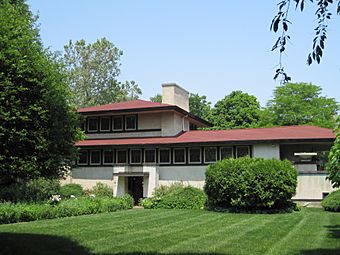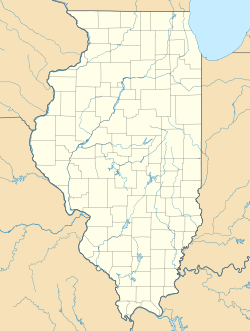F. F. Tomek House facts for kids
|
F.F. Tomek House
|
|
|
U.S. National Historic Landmark District
Contributing Property |
|

The F. F. Tomek House in 2011
|
|
| Location | 150 Nuttall Road, Riverside, Illinois |
|---|---|
| Built | 1904 |
| Architect | Frank Lloyd Wright |
| Architectural style | Prairie School |
| Part of | Riverside Historic District (ID69000055) |
| NRHP reference No. | 99000632 |
Quick facts for kids Significant dates |
|
| Added to NRHP | January 20, 1999 |
| Designated NHL | January 20, 1999 |
| Designated NHLDCP | August 29, 1970 |
The F.F. Tomek House, also called The Ship House, is a very old and important home in Riverside, Illinois. It's famous because it's a great example of the Prairie School style of architecture. This unique style was created by the well-known architect Frank Lloyd Wright.
Wright designed the house in 1904, and it was finished in 1906. The Tomek House shows how the Prairie style developed. It even helped inspire Wright's later, very famous Robie House built in 1908. The Tomek House is part of the Riverside Historic District. It was named a National Historic Landmark in 1999, which means it's a very important place in American history.
The History of the Tomek House
The Tomek House was built for Ferdinand Frederick Tomek between 1905 and 1906. Mr. Tomek worked in a factory that made picture frames and wooden decorations. The Tomek family lived in the house until 1924.
This house is considered a key part of how Frank Lloyd Wright's Prairie School design style grew. Another architect named Barry Byrne helped Wright with the house's design. The Tomek House was like a practice run for Wright's amazing 1910 design, the Robie House. Just like with most of his projects, Wright also designed the furniture inside the Tomek House.
Protecting a Historic Home
In 1973, a survey of Illinois's old buildings recognized the Tomek House as a very important site. The house has been carefully restored to its original look. In 1979, the Moran family, who owned the house, received a special grant from the Illinois Department of Conservation to help with this restoration.
The Illinois Historic Preservation Agency approved all the changes made during the restoration. They even gave the house a "Certificate of Rehabilitation." In 1993, the Frank Lloyd Wright Building Conservancy was given an easement. This is a special agreement that helps protect the house for the future.
On January 20, 1999, the National Park Service officially named the Tomek House a National Historic Landmark. This honor means the house is important to the entire country's history.
 | Stephanie Wilson |
 | Charles Bolden |
 | Ronald McNair |
 | Frederick D. Gregory |



